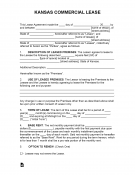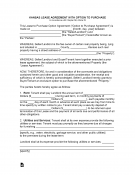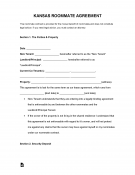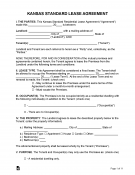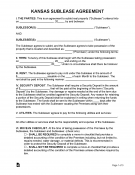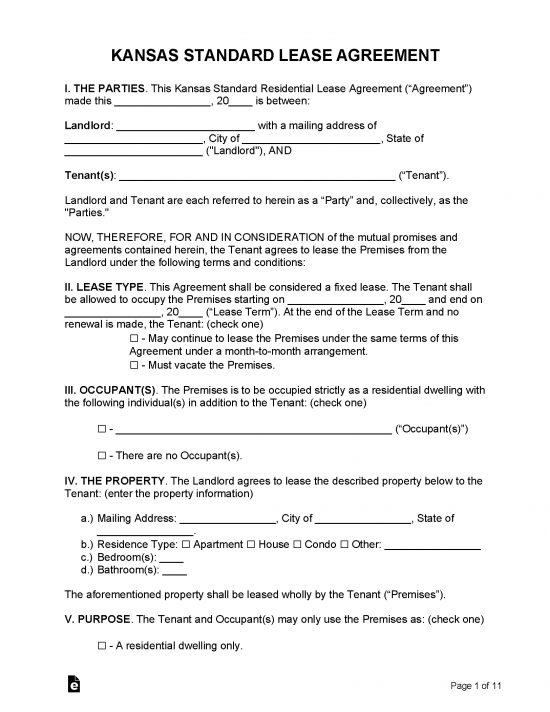Kansas lease agreements contain the terms that govern a tenancy. Lease agreements will include essential items like the specifics of rent and responsibility for utilities, and can also set out the obligations of the landlord to make repairs or the tenant to maintain a property. Both the landlord and the tenant should possess a copy of the lease agreement, and refer to it when questions or issues emerge about a property.
Contents
- Kansas Lease Agreements: By Type (6)
- Landlord-Tenant Laws
- Handbooks and Guides
By Type (6)
- Commercial Lease Agreement
- Month-to-Month Lease Agreement
- Rent-to-Own Lease Agreement
- Roommate Lease Agreement
- Standard Lease Agreement
- Sublease Agreement
Download: Adobe PDF, MS Word, Rich Text Format
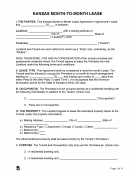 Month-to-Month Lease Agreement
Month-to-Month Lease Agreement
Download: Adobe PDF, MS Word, Rich Text Format
Download: Adobe PDF, MS Word, Rich Text Format
Download: Adobe PDF, MS Word, Rich Text Format
Download: Adobe PDF, MS Word, Rich Text Format
Download: Adobe PDF, MS Word, Rich Text Format
Landlord-Tenant Laws
Statutes – Chapter 58, Article 25 (Landlords and Tenants)
Required Disclosures (3)
Authorized Persons – A landlord must disclose the names of people who are authorized to receive requests or come on to the property to conduct repairs, as well as provide an address or means of reaching them (§ 58-2551).
Lead-Based Paint Disclosure – Under federal law, any agreement to lease a dwelling unit erected before 1978 must be accompanied by a disclosure of the risks associated with lead-based paints.
Inventory and Condition of the Premises – Within five (5) days of the tenant taking possession of the property, the tenant and the landlord should walk through the dwelling unit and use this checklist to note the condition of each part of the property (§ 58-2548).
Security Deposit Laws
Maximum Amount ($)
Landlords may charge no more than one (1) month’s rent as a security deposit. If the unit is furnished, the landlord may charge an additional half-month’s rent. The landlord may also or additionally charge an additional half-month’s rent if the tenant plans to have a pet in the dwelling unit (§ 58-2550).
Returning to Tenant
A landlord may retain a portion of a tenant’s security deposit to cover overdue rent, or expenses related to a tenant’s failure to comply with the lease agreement or other applicable law. The landlord must return the funds to the tenant within fourteen (14) days of determining the amount to be retained or thirty (30) days of the termination of the tenancy, whichever is sooner. If the landlord chooses to retain a portion of the deposit, the landlord must also provide a written, itemized description of these expenses under the same time frame. The landlord should mail the funds and itemized list to the tenant’s last known address (§ 58-2550).
When is Rent Due? (grace period)
A landlord and tenant may agree on a date and place on which rent is due in the lease agreement. There is no statutorily mandated grace period.
Eviction Notice (non-payment)
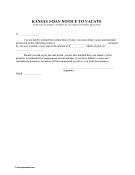 3-Day Notice to Pay or Quit – If the tenant fails to pay rent on the date specified in the lease agreement, the landlord or an agent of the landlord may post this notice on the property, which signals the beginning of the three (3) day period after which the landlord may initiate eviction proceedings (§ 58-2564).
3-Day Notice to Pay or Quit – If the tenant fails to pay rent on the date specified in the lease agreement, the landlord or an agent of the landlord may post this notice on the property, which signals the beginning of the three (3) day period after which the landlord may initiate eviction proceedings (§ 58-2564).
Download: Adobe PDF
Maximum Fees ($)
Late Rent Penalties
Late fees are permitted. If a landlord chooses to impose a late fee, the fee should be reasonable. The fee should not be higher than $20 or 20 percent of the monthly rent (§ 58-816a)
NSF Checks
A landlord may charge no more than $30 for providing a rent check with insufficient funds (§ 60-2610)
Tenant’s Unclaimed Property
If a tenant leaves behind personal property after the termination of a lease, the landlord may remove the property and store it at the tenant’s expense. The tenant may retrieve the property by paying the associated storage costs. The landlord may dispose of the property, including selling it, no fewer than thirty (30) days after taking possession. In order to sell the property, the landlord must publish a notice of the impending sale in a newspaper in the county where the property is located at least fifteen (15) days before the sale. At least seven (7) days before the sale, the landlord should mail a copy of the newspaper notice to the tenant’s last known address (§ 58-2565(d)).
